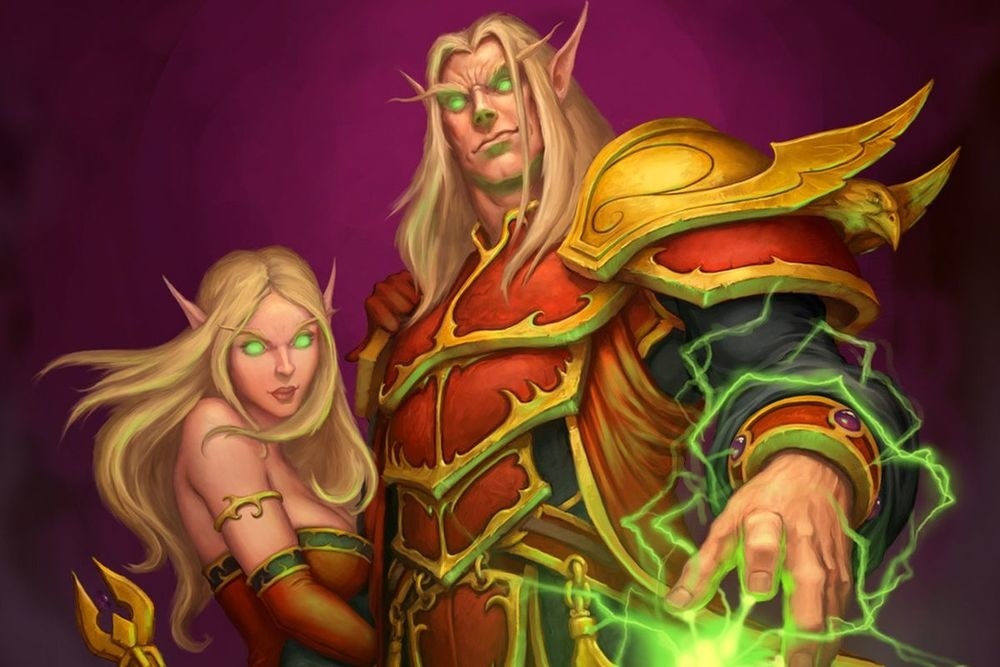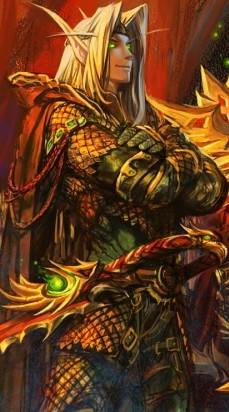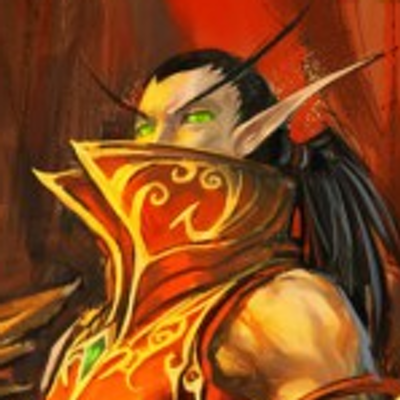
Official Name: Quel'Thalas
Dominant Species Sin'dorei (blood elves)
Capital City: Silvermoon
Government Type: Regency (effectively closer to a meritocratic oligarchy)
Governing Body: Silvermoon Council
Head of the State: Regent Lord Lor'themar Theron (in the name of Prince Kael'thas Sunstrider)
Remnants of the once glorious kingdom of Quel'Thalas the blood elves give their all for survival and to avenge their fallen. They desperately fight off the Scourge, fully willing to show no restraint in their once conservative use of magic to accomplish this. At the same time they suffer symptoms of mana addiction, requiring to siphon magic just to sustain themselves. During these dire times their Prince is on a journey searching for their salvation, taking the best of their kin with him. Those who have remained are struggling to keep their lands from the constant onslaughts yet at the same time they dream of returning to the glory days, the restoration of their might and status. Only time could tell if they succeed.
Recent History
After the conclusion of the Second War the elves considered their debt being paid off and left the Alliance. When the Scourge threatened Lordaeron they locked themselves up in Quel'Thalas save for a token assistance of priests and mages (though the latter came from Dalaran). They were not ignorant to the plight of others but didn't go out of their way to help the struggling Alliance, many humans taking this as an act of betrayal. After the fall of Lordaeron the Scourge headed directly towards Quel'Thalas. Greatly outnumbered the elves chose scorched earth tactics to delay the undead, in the region now referred as the Ghostlands. The Farstriders and the Thalassian Army commanded by Sylvanas Windrunner protected their home valiantly yet for some reason the Scourge knew exactly how to dismantle their defenses. After Sylvanas' death the Scourge had a clear path towards Silvermoon. Evacuations immediately began through portals to Sunstrider Isle yet they were short on time and more than half of the citizens couldn't escape the Lich King's wrath. Meanwhile the Conclave along with King Anasterian chose to make the final stand at the Sunwell Plateau but mysteriously high ranking Magisters died, one after another. They had a traitor among their ranks, the powerhungry Dar'Khan Drathir. He nominally pledged allegiance to the Scourge yet in truth he only wanted the Sunwell for himself. His plans were thwarted but not before he manages the fiddle with the well, denying its blessings to the elves. Weakened and low on numbers subsequently the high elven resistance is brutally massacred, King Anasterian and all members of the Conclave killed. Arthas reaches the Sunwell and uses its boundless energies to resurrect the necromancer Kel'Thuzad, turning him into a lich. With his duty fulfilled Arthas' main force leaves the country, marching towards Dalaran. [to be continued...]Controlled Territory

Culture
Blood elves are the surviving members of Quel'Thalas, named as such in honor of those who had fallen to the Scourge. In many aspects blood elves are the continuation of the Highborne culture, yet taking it even further. While the Highborne pursued magic they retained the faith of Elune and harmonious relationship with nature. High elves broke away from this practice yet still tried to retain balance with the environment. Blood elves on the other hand are all about domination. They desire control and consider themselves masters of their nature. Taboos are broken, magical experiments previously unthinkable are in full swing. Warlocks and the research on demonology is in full swing. Elves in the past refused technology, believing it to be savage and destructive. With survival of their entire species at stake the blood elves no longer have any qualms about technological inventions, even willing to merge them with magic research. Overall this behavior had a major impact on their culture, valuing innovation and progressive views above outdated traditions. Revolution is in full swing. Blood elves strive to regain their former glory but they do not intend to just stop there. Like their new national symbol the Phoenix they intend to rise again and become something even greater. It comes as no surprise that such change came in hand with a moral crisis. High Elves used to be strong supporters of the Light yet during their darkest day it abandoned them. Even a good number of priests had abandoned their faith and sought power and vengeance. While some blood elves remained faithful to the religion, they quickly became the minority and occasionally they face discrimination or actions from their own government to remove them. Within just a short two years since losing the Sunwell blood elven society collectively turned their back to the light.With the literal extermination of the Conclave it was inevitable to establish a new form of government. As the last known surviving descendant of the Sunstriders prince Kael'thas naturally became the next ruler. Yet he refused coronation and retained his prince title, devoting his all to fighting the Scourge. Lor'themar became the Regent Lord in his absence though he didn't strive for absolute power. Instead he formed the new Silvermoon Council with the leaders of each influential circle. Farstriders representing the military, Silver Wheel representing the merchants, Dawn Library representing the clergy and the reformed Magistrate representing the mages. In total though the Magistrate has disproportionate influence which is also shown in them having more than twice as many representatives in the Council than any other organization. Elves suffer trying times and this calls for desperate measures. The power of the Council is absolute and disagreeing with them equals treason. It isn't unheard of for dissenters to have a mysterious change of heart after a member of the Magistrate visits them. Groups that didn't agree with the changes in Quel'Thalas were soon exiled. The leadership is willing to use every tool in their repertoire to keep their society united through these hardships, no matter the cost.

Blood Elves are the remnants of the high elven race, named in honor of their fallen. They have slender builds, pointed ears and caucasian facial features. In terms of height they are as tall as humans but remarkably shorter than night elves or trolls (if they stand straight). As descendants of the Highborne and basking in the Sunwell's mana for thousands of years it isn't surprising that they are highly gifted in the arts of arcane, spellcasting being almost like a second nature to them. Slowly but surely the blood elven society diverges from their predecessors but some scholars believe there's much more than that. High elves are gradually changing, becoming something else. The first sign is the glowing green eyes, some associating it with the corruption of fel. Yet most elves never make contact with fel and newborn also sport similar eyes, implying its genetic nature. Perhaps in a few hundred years the blood elves transform into something entirely else, just as the Highborne turned into the high elves.
After the loss of Sunwell they began to suffer from mana addiction, feeling weak without a supply of magic power which could eventually result in death. To alleviate this the blood elves learned the art of siphoning mana, be it any source. Mana crystals, magical creatures, anything. Some begrudingly accepted the practice that is very close to vampirism while others embraced this freedom entirely, becoming stronger than ever. Yet overall mana addiction is something their race wants to get rid off. Worse, overindulgence in arcane magic could have dramatic effects, turning them into the foul Wretched. The exact conditions for this transformation are unknown, some could avoid it while taking in high amounts of magic daily while for others even a single slip could lead to becoming one of the creatures. So far nobody found a method to turn Wretched back into proper elves. Of course with mana tapping techniques being relatively new it also means the amount of Wretched are somewhat low, yet it is nonetheless an alarming occurrence.
Technology
Just as their predecessors the blood elves are masters of magic, arcane powers are almost a second nature to them. Spellcasting is widespread even if the average elf is no match for most apprentice mages. Elven enchantments are well-known and recently the recklessness of the blood elves pushed this even further. Every elven item is enchanted to some degree, be it apparent like an autonomous broom for cleaning rooms or subtle like their linen enchanted to feel softer. Mana crystals are also widespread with huge specimens often floating around settlements. Before their fall the crystals served as collectors for the Sunwell's energies to be utilized for special purposes. Nowadays they are direct mana batteries that sustain their society. After the expedition to Outland, the Sunfury returnees provided Quel'Thalas with a new influx of crystals of various origin. Fel crystals from the Burning Legion were the most common and their energies helped to raise portion of the city back into working order. Aside from that they also stole and currently analyze Naaru crystals and technology based on them. Thanks to the arrival of Mo'arg engineers the blood elves also turned the ruins of the North Sanctum into a mana forge, siphoning arcane energies directly from the leylines. While the long term effects of such method are questionable this method alleviates some of the troubles at finding a source for the blood elves to feed on. Back to the mana crystals, aside from them being repainted to the now customary blood red they also received various upgrades. Their capacity was pushed to the limit while enchantments enabled the crystal to have functions like erecting barriers or throwing arcane bolts at invaders. Said barriers function somewhat similar to the legendary Ban'Dinoriel in the fact they mask the usage of arcane magic, keeping them safer from the demons.Military
The Scourge overall murdered 75% of the Thalassian elves yet their army suffered far worse. Be it the elite troops who made desperate last stands or the rank and file who faced brutal attrition, the high elven military was virtually annihilated. The mana addiction also decimated the elvish forces who realized their dependence on magic abilities while suffering from deprivation is a curse. The only reliable force in Quel'Thalas were Farstrider Lodge who quickly rose from border guards to the chief military organization of the elves. This situation was intended to be temporary as with the return of Prince Kael'thas and his elites from Dalaran the majority of the undead were expelled from Eversong Woods. Yet with the prince's departure to assist all those who suffer from the Scourge returned this duty to the rangers. As such currently the Farstriders represent the military force of Quel'Thalas once again. With the main front pushed away from their borders their duties mostly consists of patrols and policing yet their limited numbers made these duties quite a challenge. Training new rangers could've taken decades as such Lor'themar issued the creation of a new volunteer militia, the Scout Brigade. Unlike rangers who were masterful foresting archers the Scout Brigade is a mass army trained only in the essentials. Breaking away from their archery customs this force relies on enchanted guns in combat which shortens training to only a couple of months. Another benefit of guns was related to the blood elves curse. Archers regularly imbued their arrows with magic properties to compete against various powerful creatures. While this practice was far less taxing than attacking through spells it regardless was a luxury not everyone could afford. The newly created elvish guns are powered by enchanted powder and mana crystals, taking away the taxation from the user. In addition mana crystals supplied for the guns can be also tapped by the users when their addiction gets too strong.While the Scout Brigade provides the bulk of the Farstriders, they are far from the only asset. Arcane artillery reverse engineered from Mo'arg constructs are also found use. In addition after centuries of ban by King Anasterian the blood elves reactivated their Arcane Golems, featuring various improvements and providing shock troops for the frail elves. A limited number of the elites also remained in Silvermoon under the title Dawnguards who feature powerful warriors, battle magi like Spellbreakers and some of the only surviving squadrons of Dragonhawk Knights. Naturally their affliction keeps their activity limited and usually constrain them to patrol Silvermoon but they can be an impactful group in the right hands. Another emerging elite is the Blood Knights. After the catastrophic Scourge invasion most elves lost their connection to the light yet the Magistrate found a new way wielding it. Using the imprisoned Naaru gifted by Kael'thas from Outland they directly leech the energies of the Light from the entity for their own purposes, using it as a battery for their own twisted version of the paladins. For the time being Blood Knights are a recent phenomenon and they have limited impact yet they have a promising future. Aside from them the blood elves can also rely on their own spellcasters even if their best are currently fighting at the side of their prince. Overall, Quel'Thalas is in a desperate condition yet working at a lightning pace to regain its former military might (if not even surpass that).
Notable Characters
 Class: Ranger
Class: Ranger

Allies
- Sunreavers: The primary elven faction within Dalaran are those under the wing of archmage Aethas Sunreaver. As member of the Council of Six he has considerable influence yet recently he's in a precarious situation. Dalaran directly assisted Garithos' imprisonment of his kind which infuriated elves while also rose the anti-elvish sentiments among humans. Aethas is intent on supporting his misfortune country yet he cannot risk the uneasy peace within Dalaran. As for personal beliefs Aethas fully embraces the change which blood elven society embodies, although not to the same fanaticism as Rommath who openly allows warlocks and demons within the city.Non-Lordaeron Allies:
These allies exist for lore reasons but them lending direct support to Quel'Thalas is unlikely.
- Sunfury Expedition: Kael'thas gathered the best of the blood elves and ventured for Outland, hoping to find a cure for his people and discover means of restoring the glory of Quel'Thalas. Back at home the Sunfury are hailed as heroes and everyone puts high hopes in their success. More recently the Sunfury set forth to Northrend, intent to destroy the Lich King and put Arthas to justice.
- Illidari: The followers of Illidan who are willing to use extreme measures to protect Azzeroth. While in the past elves would've never sided with monsters not to mention demons their present plight and the ensuring willingness to go for the extremes brought the blood elves to a common ground, even if relations are far from optimal. The fact Kael'thas trusts the Illidan if not outright reveres him does help easing the hostilities but the common elf is still distrustful to them. More recently the elves managed to create a portal leading to the Black Temple of Outland, albeit it only allows very limited traffic.
Enemies
- The Scourge: Despoiler of their lands and responsible for murdering most of their brethren the blood elves feel seething fury towards all undead. Even after retaking Silvermoon and liberating most of Eversong Woods they are at a constant war with the Scourge. While outbreak of undead can happen anywhere the most common fronts are the Dead Scar and Ghostlands. Aware of the ties between the Scourge and the Burning Legion, this hatred of course extends to the Legion's demons, too.

